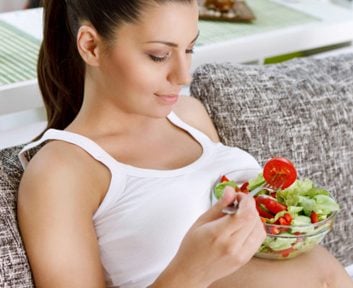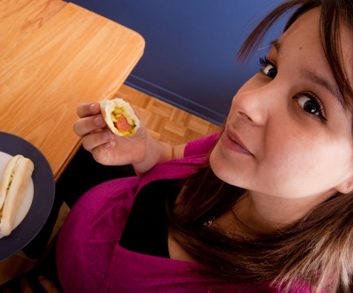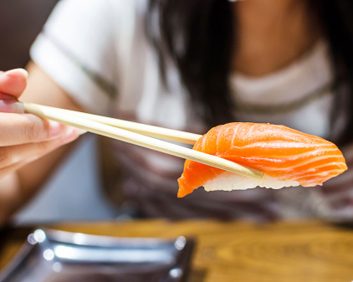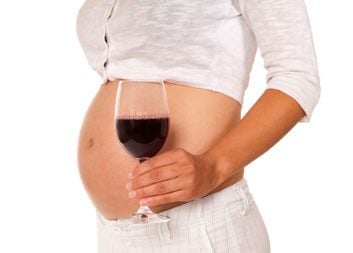
Which foods are off-limits during pregnancy?
Can you tuck into that tuna salad sandwich you’re craving? What about that wine and cheese party-can you nibble on a little Brie? If you’re confused about what you can and cannot nosh on during your pregnancy, you’re not alone. “The whole reason women are counselled to avoid specific foods is because of the risk to the fetus,” says Nishta Saxena, a clinical dietitian and lecturer with the University of Toronto’s Family and Community Medicine department. “So it may be there are foods that increase the risk of miscarriage or low birth weight, for example. A lot of times it isn’t necessarily the risk to the woman.” Need to know more? Here’s what foods you should avoid over the next nine months.

Cold cuts and hot dogs
Usually, the primary concern with processed meat is nitrates, a preservative that helps prevent the growth of bacteria, adds colour, and is unfortunately also linked to colon cancer. For pregnant women, an even bigger concern with processed meat is a bacteria called listeria. (In 2008, Maple Leaf Foods, a producer of deli meats, had a listeria outbreak in one of its processing plants.) “Pregnant women are 13-15 times more likely to contract listeria due to the hormonal and immune system changes during the gestation period,” says Saxena. “Nobody wants listeria – but pregnant women can contract it much more easily than the general population.” The scariest part? Contracting listeria in pregnancy can raise the risk of a stillborn birth.

Raw eggs, fish and meat
Say goodbye to sashimi and steak tartare. “We don’t recommend these because they can have coliform bacteria, toxoplasmosis or salmonella,” says Madeleine Clin, a midwife with Milverton, Ontario’s Countryside Midwifery Services. (Salmonella can lead to complications in newborns and infants.)
While raw fish and meat are more easily avoidable, sometimes it’s hard to detect where raw eggs may be found-think Caesar salad dressings and homemade mayonnaises. “Most commercial mayonnaises are not made with raw eggs,” adds Clin. “The concern is more if you’re making your own or you’re getting some of the specialty gourmet mayonnaises – you should check the label.”

Alcohol
While the main concern about drinking alcohol during pregnancy is the development of birth defects and fetal alcohol spectrum disorder (FASD), the thinking has somewhat changed on alcohol and pregnancy over the years. A 2013 study from researchers at University of Bristol’s School of Social and Community Medicine concluded that moderate amounts of alcohol in pregnancy didn’t harm the development of children. “They wanted to look at women who abstained or had a low intake – which was between one to two drinks per week – and technically speaking they found there wasn’t as perceived a risk as previously thought in terms of growth and cognitive development,” says Saxena.
That said, while a drink once in awhile may be fine, it’s still not recommended for pregnant women. “It’s not just about the risk,” says Saxena. It’s also important to ask, “Is it beneficial to your baby?” While avoiding risk is definitely important, it’s even better to take it further than that. Saxena says many women want to improve their diets when they get pregnant because they know it’s better for their baby.

Soft or mold-ripened cheeses and raw milk and cheese
You don’t have to give up all cheese while pregnant, but some have to go. Think brie, chevre and blue – along with the other tempting array of cheeses in the gourmet deli case. You’ll also need to ditch other unpasteurized products such as raw milk and apple cider.
Why? Again, listeria is a risk. Listeria may not cause problems in someone who isn’t pregnant, says Clin. “But women who are pregnant are at an increased risk – and it’ll usually affect the baby to some degree.” Sometimes listeria symptoms go unknown in pregnant women, so problems may not be detected until the birth of the baby.

Caffeinated drinks
Research continues in the area of caffeine and pregnancy. (One 2013 review study from the University of British Columbia and Ipoh Specialist Hospital in Mayalsia concluded that “there is insufficient evidence to confirm or refute the effectiveness of caffeine avoidance on birth weight or other pregnancy outcomes,” for example.)
However, if you’re going to drink coffee, a primary source of caffeine, Saxena suggests being picky about what kind. “Look for freshly ground coffee from a premium chain or brand or good-quality beans, because coffee is a high source of antioxidants,” she says. Generally, it’s recommended that 300 mg of caffeine a day be the maximum a pregnant woman consumes – and that includes caffeine from sources such as pop, chocolate, teas, coffees and more. “Caffeine in excessive amounts is associated with low birth weight – and, in the first trimester, an increased risk of miscarriage,” Saxena adds. So generally one or two cups a day is acceptable. (Want to stretch out the coffee? Make it a latte and top it with calcium-rich steamed milk.)

Diet pop and products containing aspartame
This non-nutritive sweetener-the food substance that’s been the most studied ever, notes Saxena-can be found in a number of products, from yogurt to pop to gum. “There is, in pregnancy, some links to potential harm, so the goal would be to lower the amount of non-nutritive sweetened drinks to the lowest level possible,” says Saxena. “There’s absolutely no benefit to pop at all. Even having a cup of coffee would be better than having cola.” If, however, you have diabetes and are pregnant and use non-nutritive sweeteners regularly, talk to your healthcare practitioner about what’s best for you-they may suggest switching to another sweetener or skipping it altogether.
Related:
• 8 steps to a healthier pregnancy
• What to eat when you’re pregnant
• How to avoid gaining excess pregnancy weight
